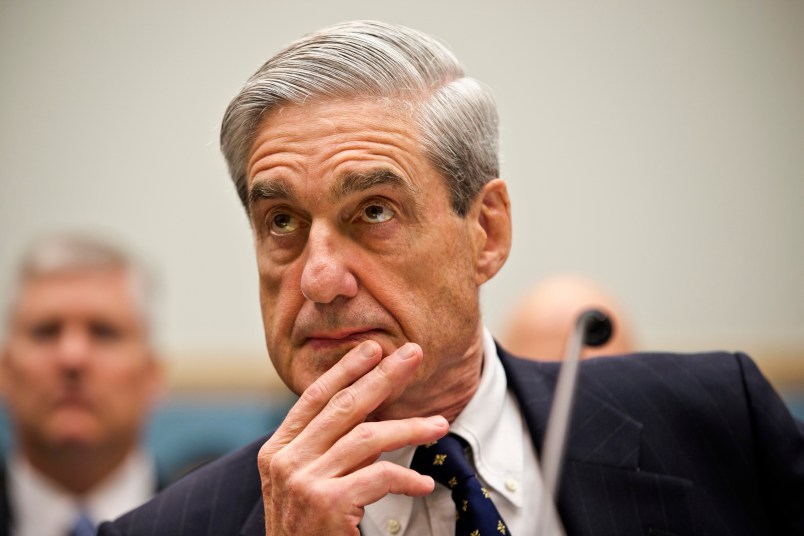It’s not surprising that Special Counsel Robert Mueller is interested in the role Facebook played in Russia’s campaign to influence the 2016 election. Yet, the news that broke over the weekend that his team had obtained a search warrant to access information about Facebook’s recently disclosed Russia-linked ad spending is the clearest sign yet of the breadth of his probe, the pace at which its moving along and what kind of case he might be trying to build, regardless of whether he ultimately brings criminal charges.
“This is not a wild goose chase, it’s not just a fishing expedition. [It shows] that there is good reason to be believe that someone committed criminal behavior, we just don’t know who that was and exactly what the behavior was,” Laurie Levenson, a Loyola Law School professor and former federal prosecutor, told TPM.
“Given the recent revelations, it’s hard to keep calling this a witch hunt,” she later added.
That Mueller had sought a search warrant for information about Russia ad buys on Facebook was alluded to first in a Wall Street Journal report Friday evening, and confirmed by CNN on Saturday.
Getting a search warrant is a higher bar for Mueller to clear than a grand jury subpoena, another tool Mueller is using to obtain documents and testimony.
“To get a search warrant like that, you have to show a judge that there is probable cause that evidence of a crime will be found at the location,” said Harvard Law professor and former federal prosecutor Alex Whiting. “The fact that they got a search warrant shows that the investigation is moving forward and that they have found some evidence of crimes.”
Furthermore, former federal investigators tell TPM that it’s likely that the warrant Mueller obtained is tailored and focused in a way only possible if you have a good idea of what you think you’ll find.
“It has to be particularly described, what he is looking for,” said Asha Rangappa, who was a counter-intelligence agent for the FBI and now a Yale Law School professor. “A judge isn’t going to sign off some sort of blanket warrant that tells Facebook to turn over everything.”
Facebook admitted in a blog post earlier this month, before the revelation of a Mueller search warrant, that it had identified $100,000 in spending on about 3,000 ads purchased by 470 “inauthentic” accounts “likely operated out of Russia.”
It wasn’t clear exactly what prompted Facebook, which is notoriously secretive about its internal operations, to come clean on what it found. Congressional investigators running their own Russia probes have since signaled their interest in what Facebook has learned about Russia’s involvement in politically-tinged Facebook posts.
A search warrant, however, would oblige Facebook to be responsive to Mueller in a way a voluntary request does not.
“For Facebook, voluntarily turning over the information may not be the approach they want to take because their image is, ‘We trying to protect privacy of people’s information,'” Levenson said. “A subpoena could be used, but I think in this situation the message their trying to send to the Facebook customers is, ‘We follow the law, but we’re not voluntarily turning over your information.’”
A question that has emerged since Facebook publicly admitted the presence of the accounts is whether the social media platform was the site of any criminal election law violations. Foreign nationals are prohibited from making political contributions — including money as well as other things “of value” — in U.S. elections. It is also illegal to aid and abet a foreign national’s contributions to a campaign.
A question for Mueller’s team is who was behind the Facebook campaigns and whether the Facebook activity qualifies as a contribution “of value” under federal election law.
Mueller also appears to be interested what sort of criteria was used by the ad purchasers in targeting the content, the Wall Street Journal reported. According to Rangappa, even some of the most sophisticated foreign intelligence operations may be unfamiliar with the nuances of American politics.
“If the targeted criteria was so specific that they would really need someone who would know American culture and campaigns to help them, who would that person be? Who would have that knowledge?” Rangappa said.
However, legal experts caution that a search warrant is by no means a predictor that the Mueller probe is heading towards an indictment.
“It doesn’t meant that they have found evidence of crimes committed by Americans — it could be crimes committed by Russians—and it doesn’t mean that somebody may be charged with a crime,” Whiting said.
“Some of these investigative moves, might be consequential and might be really leading to something, and some may be more crossing off less promising leads but making sure everything is chased down,” he added.







“It’s (Almost) Mueller Time!”
So while Mueller is making his moves… Trump makes noises that sound like that time he wanted Army Tanks as part of the inauguration. https://twitter.com/SteveKopack/status/909860227712942081
Y’all put these oversized .jpgs up and no one can reach through them to comment without replying to your post. Annoying.
Mueller is looking at 45’s involvement in the Miss Universe pageant there, also too.